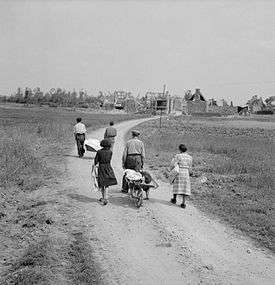Post-war
In Western usage, the phrase post-war era (or postwar era) usually refers to the time since the end of World War II, even though many nations involved in this war have been involved in other wars since.

More broadly, a post-war period (or postwar period) is the interval immediately following the end of a war. A post-war period can become an interwar period or interbellum, when a war between the same parties resumes at a later date (such as the period between World War I and World War II). By contrast, a post-war period marks the cessation of conflict entirely.
Post-war
Chronology of the post–World War II era
The term "post-war" can have different meanings in different countries and refer to a period determined by local considerations based on the effect of the war there. In Britain, "post-war" refers to the period from the election of Clement Attlee in 1945 to that of Margaret Thatcher in 1979, a period of so-called post-war consensus, while it may also refer to a shorter period, ending in 1960 or shortly after and corresponding to the 1950s era, hence 1945–1960.[1][2][3]
Cold War era
Considering the post-war era as equivalent to the Cold War era, post-war sometimes includes the 1980s, putting the end at 26 December 1991, with the Dissolution of the Soviet Union.[4][5] The 1990s and the 21st century are rarely considered to be part of the post-war era.
See also
| Look up post-war in Wiktionary, the free dictionary. |
- Interwar period
- Aftermath of the September 11 attacks
- Postbellum
- Pre-war
- Reconstruction Era of the U.S.
- Post–Cold War era
References
- "AEC Lorries in the post war years 1945-1979 book | #248690820". Worthpoint.
- "The Post-War Years 1945 - 1960".
- The Post War Economy: 1945–1960
- "Archived copy". Archived from the original on 2011-08-22. Retrieved 2011-06-16.CS1 maint: archived copy as title (link)
- "Unknown Forum". soapbox.websitetoolbox.com.